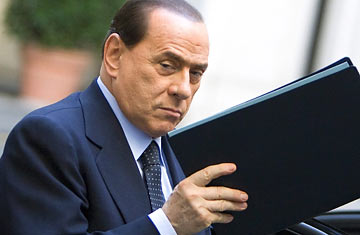
Italian Prime Minister Silvio Berlusconi arrives at Chigi palace in Rome before a meeting with Libya's leader Muammar Gaddafi.
If politics is poker, the best players know when to double down and when to cut their losses. For Italian Prime Minister Silvio Berlusconi, a sex scandal that had dogged him for months seemed to be finally quieting by late July. Though his reputation was stained, his popularity was solid and it seemed time to put the controversy behind him and get back to trying to run the country.
But in Italy these days, politics is a game of one-card stud, with everyone — Berlusconi most of all — obsessed with what it all means for Lui, that is, Him. And so even as Italians appeared to be losing interest, the 72-year-old billionaire was apparently still seething over the repeated publication of accusations from his estranged wife that Berlusconi "frequents underage girls" and the release of racy audiotapes of conversations he allegedly had with a high-priced prostitute.
A top Berlusconi aide acknowledges that the safe political calculation may have been to let the private affairs pass, particularly after being praised in July for the G8 summit he hosted in earthquake-stricken L'Aquila. "But he feels defamed," says the aide. "He has faced daily attacks for months and has decided not to take it any more." And so the prime minister apparently decided it was time to double down. On July 29, in news that then got scant attention, the Berlusconi family newspaper, Il Giornale, hired back its former attack-dog editor-in-chief Vittorio Feltri, the first move in what has turned into a major end-of-summer counter-offensive by Berlusconi that has raised the stakes on his political destiny, and risks spiraling out of control.
It came to a head this past week after Il Giornale published a series of articles alleging that Dino Boffo, editor of Avvenire, the Italian Bishops Conference daily newspaper, was a "homosexual known to the Italian secret services" and had paid damages to a woman in a 2004 harrassment case. Feltri wrote that he was publishing these accusations against Boffo, who had criticized Berlusconi's private life, as a response to his "moralistic campaign" against the Prime Minister. Il Giornale also hammered away at the Church for past scandals involving pedophile priests. After repeatedly and vehemently denying Feltri's charges, Boffo resigned on Thursday, saying "my life, the life of my family and my newsroom have been violated in an act of sacrilege." He accused Feltri and Berlusconi of trying to squash any public criticism about the head of the government.
The Boffo affair, which on the surface ended in apparent victory for the Prime Minister and as a slap against the Catholic Church, could nevertheless backfire on Berlusconi. The impression that he is now out for blood — and that no one is safe — may convince top Catholic politicians to abandon the Prime Minister despite his support for their legislative priorities on gay partnerships and euthanaisa. "There's a limit to everything, and once you go beyond the limit, things get dangerous," says one influential Catholic editor. "These incidents that spread chaos, scare everyone. The situation now is very fluid." Nonetheless, the editor concedes that for now Berlusconi's sway over Parliament, where he holds a healthy majority, is not at risk.
The longer term battle for Berlusconi is the fate of his public legacy, and his pride. Already infamous for his media conflicts of interest and political incorrectness, his image has taken an unprecedented wallop with details of an alleged obsession for sex and the ready company of a long roster of women young enough to be his granddaughters. His attempt to undo the damage of the past four months also includes a series of lawsuits against the print media outlets — both in Italy and abroad — that have focused particular attention on his woes. Over the past 10 days, he has filed lawsuits against the Rome daily La Repubblica for its repeated publication of a series of questions related to the sex scandals, as well as the Spanish daily El País and French weekly Nouvel Observateur.
Meanwhile, Berlusconi's repeated claims that he is Italy's' victim No. 1 of the media strike many as absurd, or downright Orwellian. His ownership of and influence over some 90 % of Italian television is again on bright display, as commercials have been banned on all major TV stations of a new Swedish movie that criticizes Berlusconi's media control.
The paradox, of course, is that that his filing lawsuits over the scandals sets off another round of ribald accounts of Berlusconi's private life. The latest suit was filed Wednesday against another left-leaning Italian daily, L'Unita, which had referred to a comedienne's sketch about Berlusconi allegedly taking medical injections that allow him to have sex. The Prime Minister's attorney, Niccolo Ghedini, explained to the daily Corriere della Sera on Friday that if necessary Berlusconi would testify in the libel case to prove that he is not impotent: "And why shouldn't Berlusconi be allowed to explain to 20 million Italians, his enamored supporters, that he is perfectly functional?" Such a scenario would be an unprecedented display of a politician proving he's up to the job.
